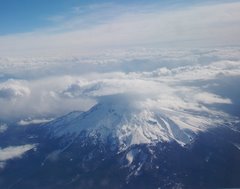By Roderick Nash
1967

Halfway through “Wilderness and the American Mind” I felt the need to go to the front cover and underline the word “mind.” Truly what Nash so straightforwardly and academically outlines in his predictable well-structured and footnoted style, is the mind of America regarding wilderness from the colonial to the pre-Rachel Carson era (post Aldo Leopold).
Most remarkably, wilderness is still (yes, even today) the binding in the American book. It is the glue that holds us together psychologically and gives us a sense of morality and American pride. It is our conscience and one of our unique features of America – both physically and mentally.
Nash points out that Joseph Wood Krutch stated in 1958 that “the wilderness and the idea of wildness is one of the permanent homes of the human spirit.” It is the idea, or the spirit of wildness, that is truly American. You don’t need to go to into the wilderness to experience something that is innate to your native psyche.

What is that “idea” of wilderness? Wilderness is freedom of expression, liberty and democracy. Robert Underwood Johnson perceived the wilderness “idea” as the embattlement of ruthless exploitation (Nash 158) where the land has survived consumption by commercial and social interests. Today, it might even be the land that survives recreational exploitation from ATV’s, snowmobiles and 4x4’s with the beauty and solitude still remaining.
When that idea is lost is when the land will be lost or destroyed. We hear the cries of the wildlife advocates for the large charismatic land animals, like grizzly bears, jaguars, pandas and mountain gorillas. We hear the warnings of environmentalists and marine scientists about the loss of diversity and indidual numbers of fish and marine mammals, such as the right whale, and fish, such as the shark and tuna. What we fail to ponder is what our moral compass will read, or diminish altogether, when we have lost these creatures or even the loss of the solitude of wilderness altogether. The idea that land and species keep us physically and mentally aware of our conscience, when those things are lost, will render our sensibilities morally inept. What will we have to strive for when that idea is lost? And where will we go to in our dreams and in our waking hour for relief and for philosophical and natural beauty and solitude?
John Muir defines the natural world in spiritual terms – Christian terms for that matter. What he lacked in religiosity he made up for in spirituality. For Muir the cathedral was the giant rock outcrops and crags that stood and weathered the wonderful thunderous storms and bright piercing life-giving sun. His spirituality melted into these feelings and images.
(to be continued)






No comments:
Post a Comment